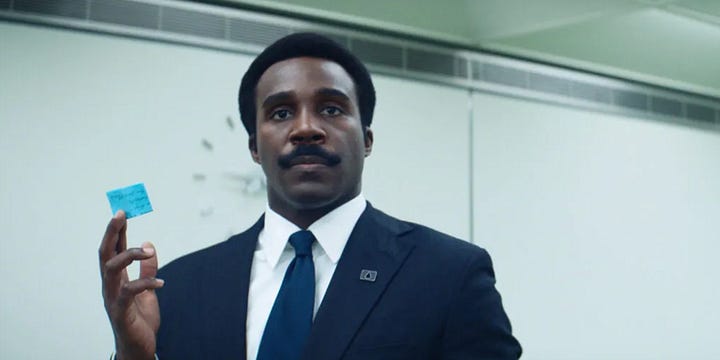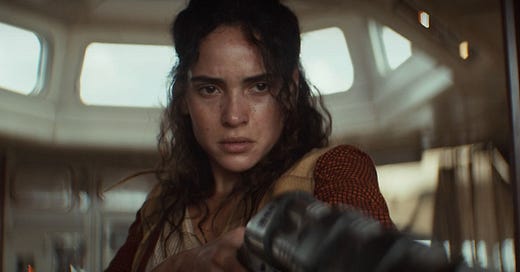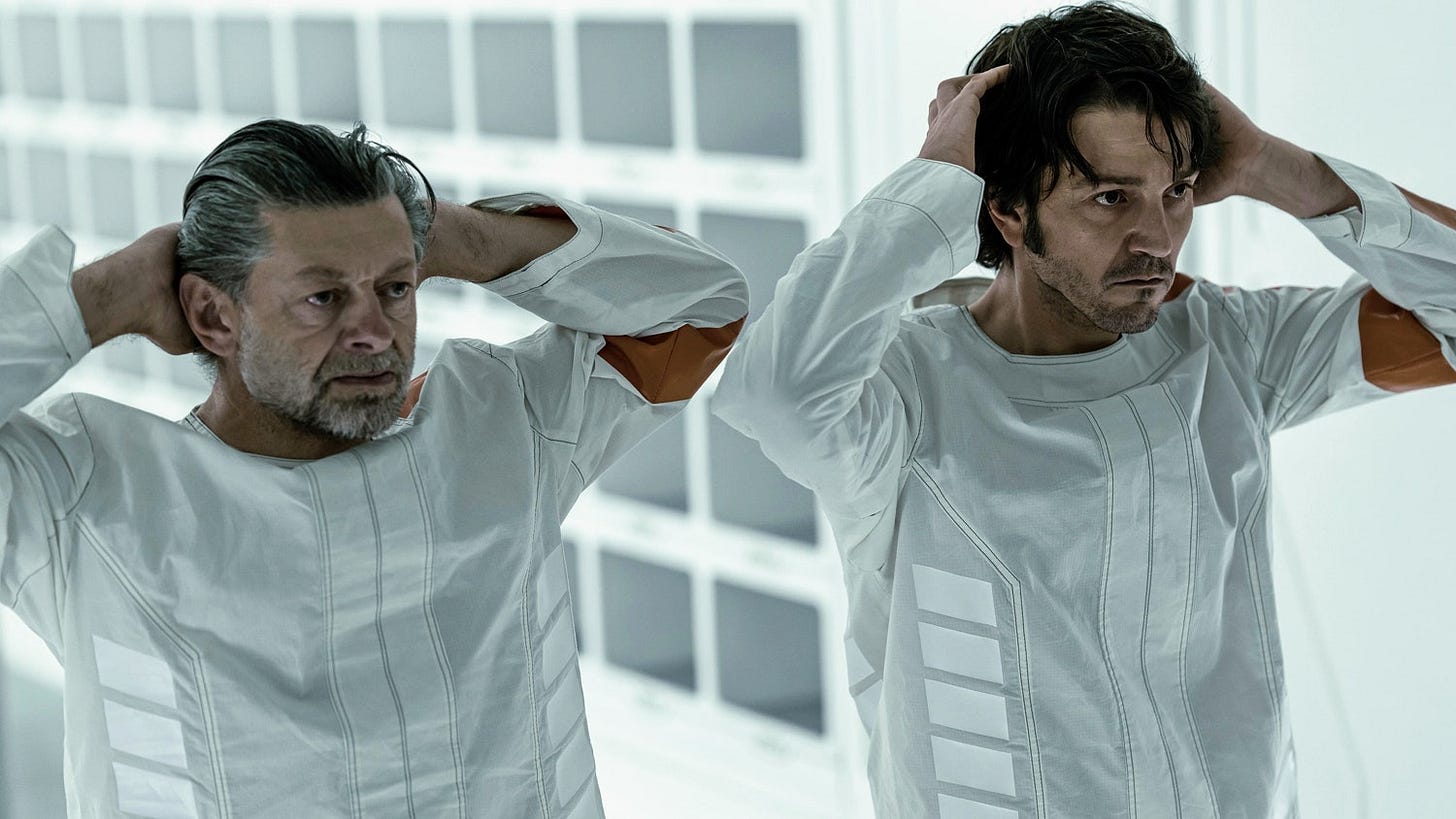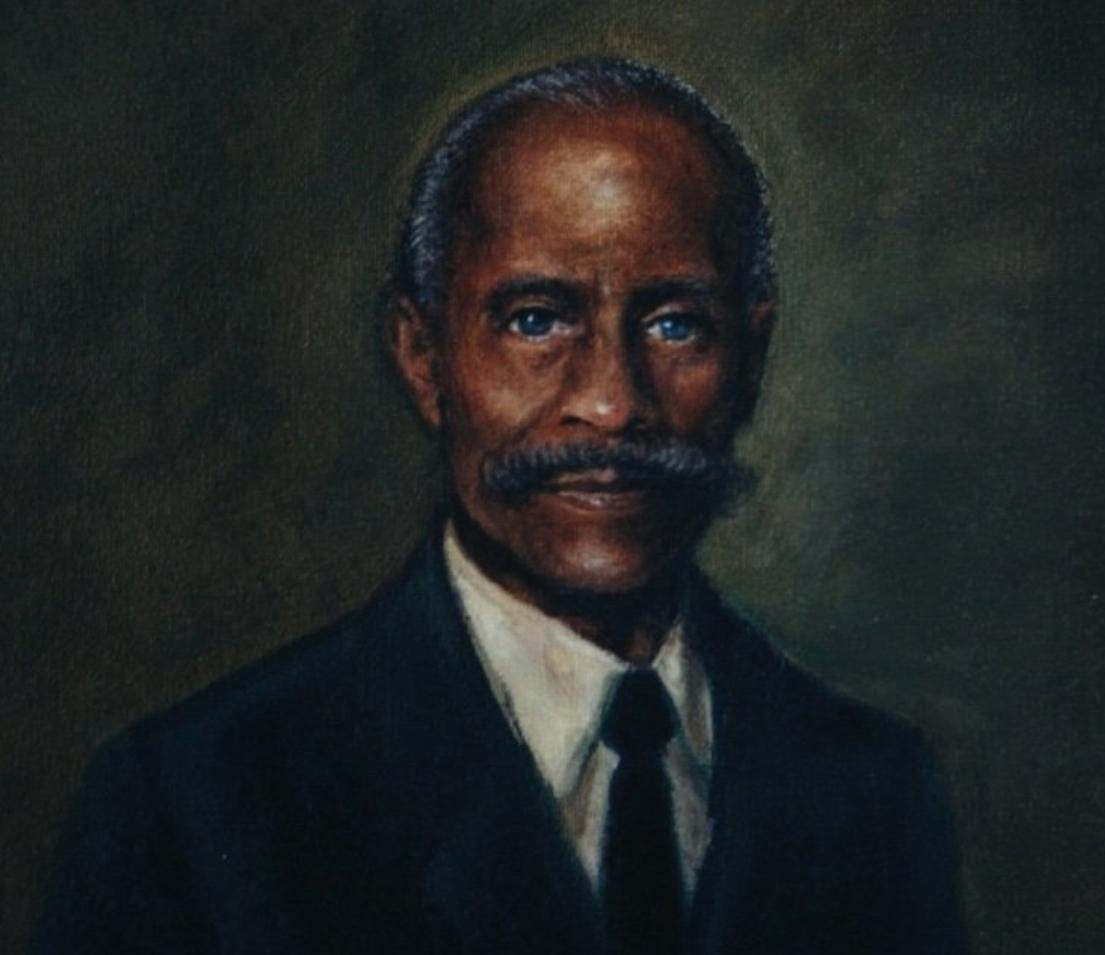Andor is 'Topical' Because It Doesn't Try
Somehow, the only long-form show for people with attention spans on television is a Star Wars prequel.
Warning: Spoilers for Severance Season 2 and Andor Season 2.
Severance Gets Mid
A month ago, I wrote a somewhat in-depth review of the first season of Severance. I planned this to be the first part in a series about the rise of science fiction television as of late. I figured that, in the first half of the year, Severance Season 2, The Last of Us Season 2, Doctor Who Season 2, and Andor Season 2 (I’m sensing a trend) would provide some fodder for analyzing why, suddenly, the Emmys’ drama category is half science fiction. Do Squid Game 2 and 3 count?
Unfortunately, I watched Severance Season 2 and found myself having nothing interesting to say about it. Severance spent most of its sophomore year doling out exposition it refused to give three years ago. It’s entertaining enough the first time you watch it, but honestly, really try and give it a second watch. I fear Severance is becoming the kind of show that’s engaging on first viewing but unrewarding on rewatch.
Severance knows that it just doesn’t have the juice for a full season of drama. The whole season circles the drain on innie/outtie Mark’s inevitable conflict, and it’s seriously padded out with bottle episodes, as well as the very strange choice to have Helly R vanish for the first half of the season to stir up some of the cheapest imaginable drama in a show for “adults”. It isn’t until episode 5 that the audience and the characters even understand what happened at the end of Season 1.
The second half of the season is particularly egregious, with two back-to-back entirely expository bottle episodes. Come on, people. If you did this 15 years ago, everyone would jump ship. To top it off, the audience still has no clue who Irving, one of the four main characters of this show, even is, what his motivations are, or what he’s doing.
I’m ragging on this show a lot, so it may surprise you to know that I think the Season 2 finale is one of the best episodes of TV I’ve seen since Succession ended. This is probably the only episode of the entire season where we have a clear understanding of the stakes: outtie Mark wants to get Gemma back, but to do that, he has to essentially kill innie Mark, or at least sacrifice his burgeoning relationship with Helly R. Innie Mark has to either go along with this, or preserve his relationship. What’s he gonna choose?
That’s a dilemma. That’s drama—characters in meaningful conflict. This is the kind of basic writing setup the show has been sorely lacking all season and has seemingly replaced entirely with “twists“ and “reveals” about the world. Reminds me of this tweet, to be honest:
In the 2000s and 2010s, we were at a blessed intersection between prestige experimental style, high budgets, and solid dramatic writing. In the 2020s, we’ve been sold a bunch of Surf Dracula reboots that occasionally have mid to solid dramatic writing. It results in one of the most popular shows of the year (I have not watched The White Lotus, and I have heard it’s similarly a mixed bag), leaving essentially no cultural imprint just a month after it ended. I had to look at Wikipedia to remember what happened this season.
But you know what stayed in my brain for three years?
ANDOR!
Confession time: I rewatched Andor with my friend Jonah in November. But I remembered pretty much every episode of this show, which I think is a testament to how strong the writing is.
I want to write about Andor both because the show has just concluded, and I also think it’s an extremely illustrative example of what shows like Severance lack, which has also fallen out of favor in the modern TV landscape: extremely clear dramatic stakes.
I won’t go as far as to claim that Andor is the best TV Show since, say, Better Call Saul (although, overall, its only competition is realistically Succession). I also haven’t watched Shogun, which I hear great things about. But what makes it stand out from its sci-fi competitors in the Emmys’ drama category (including The Last of Us, unfortunately, which has floated between kind-of-middling to kind-of-great all season) is that we know what it’s about in an extremely literal sense.
I’ll probably write a longer post on The Last of Us after the season concludes in a few weeks, as I don’t think it’s necessarily fair to criticize just yet. The problems afflicting that series are also a lot more complicated than something like Severance, which I think has, unfortunately, fairly easy-to-diagnose issues from a writing standpoint.
Andor Works Because It Knows The Basics
I think so much of Andor works because somehow, despite being a prequel to a prequel and a sequel to several other prequels, none of it feels predestined. Like Better Call Saul before it, Andor is the rare prequel that manages to feel alive and spontaneous, partly because it introduces characters who are unknown quantities in future installments, but mostly because it lets all of its characters breathe and make choices based on their experiences that may even surprise the writers.
Whereas a lot of shows seem like they work backwards from their “ideas” or “themes” or twists, Andor starts with its characters, an understanding of human behavior, the specifics of their situations, and works outwards from there. Rather than outside-in, it’s more of an inside-out approach. In college, I took a couple of classes with Better Call Saul writer Alison Tatlock, and she described the show’s writing process as fairly similar, which lines up with what I’ve read from Vince Gilligan about his team’s process for both Breaking Bad and Better Call Saul.
Here’s Tony Gilroy on his process:
We need some place to start… We need something really small. Small is good. Something small and very, very specific. The big ideas don’t work. “I want to do a movie about class warfare. I want to do a movie about corporate malfeasance. I want to do a movie about paradise.”
You’ll just drown. But something really, really small that has access to something larger. A character, a moment in time, a situation between two people. It can be anything, but something really, really small, and specific… Then I sit at my desk. I sit in front of the keyboard and I just run with it. I write around it.
-Tony Gilroy, The BAFTA Screenwriters’ Lecture Series1
The reason that I think this process works more than the outside-in, “big ideas” first approach is that “big ideas” come in with assumptions about how the world works. And when you come in with assumptions about your story, rather than letting characters live and breathe, you will never be surprised by what you write. Because of that, unless you’re really smart, like, top 0.1% smart, which, sorry to say, you probably aren’t, you will never truly surprise the audience.
But surprise isn’t necessarily what drama is after. Drama is a feeling of “oh! That makes so much sense!” Drama isn’t showing off that you’re smart. Drama is making the audience feel smart. You have to give them the puzzle pieces before you assemble them.
Maybe a better way of conceptualizing this: there are still ideas that drive your work. But these ideas are not ideas about things so nebulous like “society” and “capitalism.” They are ideas about human behavior, about the tangible, immovable forces of the world, how we react to the specifics of situations, and what kinds of people your characters are.
To illustrate how grounding a story in specifics elevates, compare two characters across Andor and Severance who occupy relatively similar positions in both narratives: Syril Karn and Seth Milchick.


Seth and Syril are kind of similar on the surface. Both are characters who buy into an oppressive, bureaucratic power structure and are gradually made to question the worth of this system, despite ultimately (at least, for Syril) not quite figuring out how to escape this structure.
Syril is a remarkably detailed character. He’s been a favorite of mine since he was introduced in season one of Andor because of how different his life is from anything we’ve ever seen in Star Wars. Syril is like if Pete Campbell from Mad Men worked for the empire and had the corresponding neuroses in a different environment. He yearns desperately for approval from bureaucracy and genuinely believes in the empire’s mission as he sees it, to create order in the galaxy. He takes pride in his work, even though other Imperial Police view him as kind of a rube.
As the series unfolds, he meets his match in Dedra, someone who similarly believes in the empire but is willing to take it to even more sadistic places. Dedra, unlike Syril, doesn’t care about the ends of her operation. As we find out, she’s almost doing it entirely from narcissism and a sense of actual joy in the torture and pain she inflicts.
On the outside, these characters have the same goals. But Syril has a real desire to do good in his own way. He wants to be seen as doing good by others and trusted by others, which we’re led to believe is a way of compensating for the lack of trust instilled by his overbearing mother. This is all just filtered through the prism of the imperial police because it’s what’s been expected of him. It’s a brilliant way of showing how systems like this can make real, understandable people function in totally alien ways. We fully understand why Syril makes every action he takes in Andor because it shows us why he is the way he is.
All of this climaxes in what I think is the series’ best episode, Season 2, Episode 8,“Who Are You?”
This episode is fantastic for a lot of reasons, and if it were simply a Star Wars recreation of The Battle of Algiers, it would have already hooked me. But I want to focus on how it concludes Syril’s story.
Over the course of the season, Syril and Dedra’s relationship has gradually been falling apart. Syril has finally figured out that Dedra has been lying to him, that the imperial work on Ghorman is a ruse to mine minerals, not a way to keep a rowdy population in check. He strangles her and threatens her to tell him the truth because, once again, he has been shown that he is not trusted. And he gets his worth from being trusted.
Outside, as the massacre unfolds, he finds Cassian, the person who he believes started him on this path back in season one. They get into an extended fight, and, as Syril hovers over Cassian, about to shoot him, Cassian just looks at him and says, “Who are you?” For a moment, Syril lowers his gun, and then he’s shot in the side of his head. You can see on his face that he has finally realized that this quest for approval, a quest for significance, was never going to work. And then he dies.
None of this behavior needs to be explained in this episode. We just get it. We know why Syril is the way he is because we’ve spent twenty episodes of TV understanding his behavior and how he will react in a given situation, and here, we see him being pushed to the limit of questioning why he acts in the way he does.
Compare this with how Severance treats Mr. Milchick. I don’t believe these two shows are under any directives to treat similar characters the same, but it’s clear to me that Severance wants us to believe similar things about Mr. Milchick that we know about Syril; that he gets his worth from his approval, but that some part of him questions this.
In the newest season, there is a minor plot point that Mr. Milchick has received a gift from his superiors of paintings of him as the founder of the company.
This seems to disgust Mr. Milchick, and it’s suggested later in the season, in another conversation with a Black Lumon employee who received the same gift, that the paintings elicited feelings Lumon hadn’t considered—what it would mean to depict a Black man replacing a white founder figure.
Now, I like these beats. They’re weird and unsettling because they play with our expectations and poke at taboos. And, yes, they challenge Mr. Milchick’s loyalty to the company that he works for. And it’s great that none of this is directly said out loud, and we just get it.
But, on the other hand, we also know nothing about Mr. Milchick. We understand what kind of character he is, but we know very little about his life in any way. The audience theorizes about it. And theorizing is fun. But it isn’t drama. It’s not satisfying. It just elicits mystery. These scenes point in the general direction of something that feels real, taboo, and unsettling, but it’s not specific. On top of this, we know virtually nothing about Lumon and what they want, so all these scenes do is remind us of similar situations in the real world.
Severance evokes, but it does not depict. Severance points toward ideas, whereas Andor literalizes everything.
Take it this way: if Severance, next season, wanted to pursue a similar arc that occurred with Syril over Andor, which I don’t think they necessarily should, it wouldn’t have the same impact. We do not understand Mr. Milchick’s life outside of his job or why he behaves the way he does. It’s a total mystery. It wouldn’t be an incredibly satisfying feeling of all these dominoes falling in exactly the right way. It would kind of just be this one domino falling over.
That’s fine. But I don’t think we should be striving for fine, and it shouldn’t be held up as the best show on TV.
What we do when we watch shows like Severance is a totally different game than the one we play when we watch Andor. Severance is engaging because we’re trying to figure out what’s going on. Andor is engaging because we want to know what happens next.
‘Themes’ Are Emergent From The Specific, Not Vice Versa
A lot of shows try to be ‘topical’ and fail. As I noted in my last post on the subject, is Severance really an anti-work show? Or does it want to be a show about babies in adult bodies that nominally pays lip service to ideas about work?
Andor also happens to be ‘topical.’ But what’s topical about it is universal and timeless. Yes, this show has come out during the Trump administration and at a moment when a lot of people feel that a historical take on rebellion is ‘relevant’ and ‘important.’
Andor is a show about ‘revolution’ because it is a show about a revolution. It is rooted in real-life historical revolutions far more than most shows of this caliber, but it is rooted in characters’ behavioral patterns more than that. The historical parallels of the series feel real because it is based on how real-life revolutions have operated and how real people have reacted and made choices in those scenarios.
Here’s Tony Gilroy being asked about Trump parallels:
But it was all written before that, and I honestly want the show to be timeless. My characters are based more on Trotsky than Trump. I’m fascinated by revolutions. If I tried to sell a movie script about a young revolutionary dying for the cause, no one’s going to back me. In fact, I’m trying to get a $40 million movie made right now; everybody loves the script, but they all say it’s really original. So, I’m f----d. But if you tell it as Star Wars, you have a place to play.
-Tony Gilroy, The Telegraph2
Andor does have ‘ideas,’ but these ideas are about what it means to be human and how we behave, not so abstract as to be able to compare to specific real-life people, fleeting trends, memes, and/or (sorry) events.
I care about culture a lot. I care about it probably more than I do most things. I think the quality of our collective media experience is important and representative of what we value as a society. I think that, more and more, we are being trained to care about the ephemeral and superfluous over the real and permanent. I do not think that is a healthy recipe for a society, a way to live, or our attention.
This is writing advice, but it’s life advice too. Find the real. The specific is real. Find what makes you feel alive. Follow it. Find the people who don’t look through you, who last. Build what you can and your ideas off of what you see with your own eyes and what you know. Flashy narratives will be fed to you, and you will need to decide what matters. I think Andor is the rare show these days that knows what matters.
As it happens, that’s sort of what Andor is ‘about’, too. It also happens to be the only show on TV (that I’m watching) to embody that idea in the way that it’s constructed.
www.youtube.com/watch?v=kv3DcXIUaRw&t=7s
https://www.telegraph.co.uk/tv/0/tony-gilroy-interview-andor-star-wars-disney-plus/?ICID=continue_without_subscribing_reg_first







